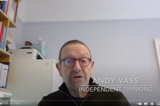As a leader, how can I improve the conversations in my school?
We asked Independent Thinking Associate and education speaker and coach Andy Vass and this is what he suggested.

“Conversations really matter. It's through conversations that relationships are forged, strengthened, or fragmented.
It's through dialogues that learning occurs or doesn't and, it's through conversations that things like well-being, redefining potential, resilience, motivation - all those critical features of excellence are either nourished and nurtured or depleted and destroyed.
What Do You Want to Achieve?
The other thing to bear in mind is that the culture of your organization is significantly determined by the predominant style of conversation that occurs, especially those initiated and sustained by it by leaders.
So, my first step would be to enter conversations that matter with a deliberate and conscious awareness of a well-formed intention - what is it you want to achieve?
What kind of thinking do you want the participants to engage in? Where would you like it to arrive at? In other words, have an intention to focus the participants’ attention.
When you do, these conversations immediately are elevated in terms of quality because, if you don't have an intention, then serendipity occurs and agendas get hijacked, things go off at a tangent and, the outcome is random and often unforeseen.
Other People's Maps
So, the kind of thing I mean by that is, for example, I have an intention to enter conversations with a higher level of curiosity and ask more questions, rather than drive your own agenda at least initially and listen to understand more.
Understand what the map of the world looks like for the other participants, before moving things in the direction that you'd like it to go.
When you have that sense of curiosity in conversations then you tap into a greater level of creativity – you get more people into their imagination which is where change occurs and you also impact on the personal narrative, the little voice in the head, the conversations that we all have with ourselves.
Move the Focus
So, have an intention to enter conversations with moving from problem to solution.
A question example would be ‘So, when the relationship with your teaching assistant is more how you'd like it to be in terms of when things are supporting more of the kids learning, talk to me about that - what will you be doing differently?’.
Have an intention to move the focus from deficit to resourcefulness.
A very simple but potent example at the end of a lesson observation is, if your opening question is “So, if you take that lesson again tomorrow, talk to me about which bits you'd keep?”.
By doing this, you're immediately focusing on what people can do, what they have done, what they welcome and what they’d like more of.
That’s very powerful sense of momentum to bring about by looking around tweaks and changes.
And, certainly have an intention to move from the past to the future.
Hijacked by a Parent
For example, that parent caught you on the back foot and just sort of hijacked you at the school gate - if something like that happened again what would you want to do? How would you want to handle it so that you felt more comfortable and it was even effective?
So, this is a lightning gallop through some nuanced potent ideas, skills and habits - I've been teaching leaders around the world for the last 20 years on this kind of stuff and I'd love to have a more in-depth and more detailed conversation about how I could help you be the best version of yourself it's possible to be - and importantly help others to do the same!"
You can check out all the other 'tracks' on our CPD Jukebox by clicking here. [ITL]
To find out more about booking Andy for your school, college or organisation call us on 01267 211432 or drop us an email on learn@independentthinking.co.uk.
Enjoy a free no-obligation chat.
Haggle a bit. Make a booking.
Call us on +44 (0)1267 211432 or drop us a line at learn@independentthinking.co.uk.

About the author
Andy Vass
Andy Vass is an experienced teacher, school leader, behaviour expert and leadership coach. He is in demand globally for his work helping schools work better at communicating and building relationships.